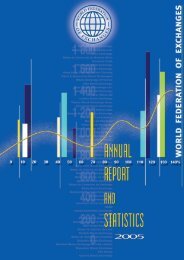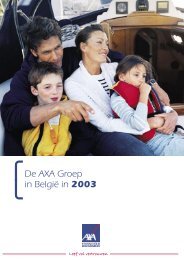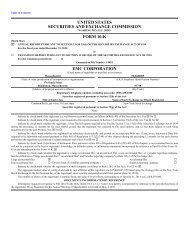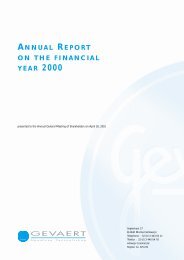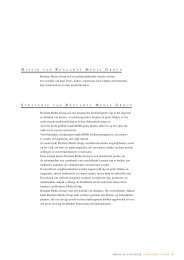Create successful ePaper yourself
Turn your PDF publications into a flip-book with our unique Google optimized e-Paper software.
Human resources policy<br />
Skills driving performance<br />
Worldwide business<br />
expansion, the Alliance<br />
with Nissan, the emergence<br />
of new technologies<br />
and shifts in demographic<br />
trends have all contributed<br />
to increasingly rapid<br />
change in attitudes<br />
and organizations.<br />
<strong>Renault</strong> human resources policies aim<br />
to offer staff members in all parts<br />
of the world the same access to training.<br />
<strong>Renault</strong> owes its success to its people, making human<br />
resources policy decisively important for performance<br />
and sustainable development over the longer term.<br />
Consolidating competitive strengths<br />
<strong>Renault</strong> sets ambitious targets for employment policies<br />
to back its international growth and face up to demographic<br />
challenges in Europe. From 2000 to <strong>2005</strong>, <strong>Renault</strong><br />
recruited nearly 43,000 people worldwide, including<br />
10,000 in <strong>2005</strong> alone. New production teams were<br />
set up for Logan in Romania, Russia and Morocco, while<br />
in France and Spain recruits brought in additional skills<br />
and made for quicker renewal of generations.<br />
In Europe, <strong>Renault</strong> is preparing to work with older<br />
employees while at the same time maintaining skills<br />
at the highest possible level through a combination<br />
of initiatives that provide for adaptation of working<br />
conditions and lifelong training. Other measures to maintain<br />
team motivation and new rules for professional<br />
development are also being implemented.<br />
Finally, <strong>Renault</strong> aims to organize work schedules<br />
to achieve a closer match with customer needs.<br />
Agreements have thus been reached to allow for more<br />
flexible working hours in France, Spain and South Korea.<br />
Backing international expansion<br />
<strong>Renault</strong> actively encourages the development<br />
of multicultural teams as part of its worldwide<br />
expansion, and in <strong>2005</strong> international recruitment<br />
accounted for 24% of the total. The international mobility<br />
of staff members is managed at Group level to ensure<br />
the best allocation of competencies around the world.<br />
An HR Functional Task Team set up within the framework<br />
of the Alliance with Nissan in October <strong>2005</strong> has been<br />
charged with benchmarking policies and stepping up<br />
the efforts put into targeted recruitment, personnel<br />
exchange and intercultural training since 1999.<br />
At the same time, <strong>Renault</strong> is developing Group-wide<br />
human resources policies by stages, defining principles<br />
that apply to all employees worldwide in accordance<br />
with its Declaration of Employees' Fundamental Rights.<br />
In <strong>2005</strong>, policies for annual performance and development<br />
reviews, recruitment and relations with employee<br />
representatives were adopted, rounding out existing<br />
Group-wide guidelines on languages, training, working<br />
conditions, pension funds and employee share<br />
ownership.<br />
Finally, in <strong>2005</strong> <strong>Renault</strong> continued work on its single<br />
personnel database to ensure consistent administration<br />
throughout the Group. At the end of the year, this database<br />
covered 19 countries, representing more than 90,000<br />
employees out of a target group of 125,000.<br />
72<br />
<strong>2005</strong> <strong>Renault</strong> Annual Report



